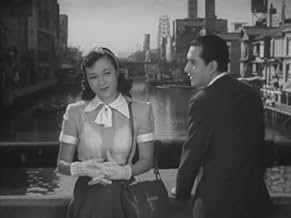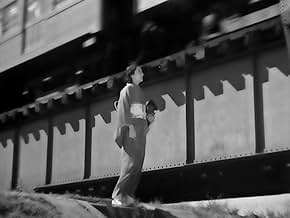Meshi
- 1951
- 1 Std. 37 Min.
IMDb-BEWERTUNG
7,6/10
1913
IHRE BEWERTUNG
Füge eine Handlung in deiner Sprache hinzuMichiyo lives in a small home in Osaka and is not happy with her marriage; all she does is cook and clean for her husband.Michiyo lives in a small home in Osaka and is not happy with her marriage; all she does is cook and clean for her husband.Michiyo lives in a small home in Osaka and is not happy with her marriage; all she does is cook and clean for her husband.
- Auszeichnungen
- 9 wins total
Empfohlene Bewertungen
A sensitive look at an unhappy housewife, with fine performances by Setsuko Hara as the wife and Ken Uehara as the everyman schlub she's married to, and incisive dialogue and characterization by, among others, Nobel Prize winning novelist Yasunari Kawabata, this film ultimately succumbs to overly deliberate pacing, too many sub plots that go nowhere and add nada, a sexist ending that is an ode to wifely submission and a general sense, for me at least, that I'd rather be watching Ozu. Give it a B minus. PS...Coulda used more of the cat and less of Satoko.
Gentle and touching portrait of a marriage. Setsuko Hara and Ken Uehara play a young married couple who have been living in Osaka for a while now, after having met and married in Tokyo. Life in Osaka is pretty dull, especially for Hara, who does little but housewife day in and day out. Uehara doesn't make much money, and his job prospects are weak. They're in a rut. When Uehara's beautiful young niece comes for an unannounced visit, Hara's dissatisfaction with life becomes too much to bear. As is usual for Naruse, the characters are extremely well developed and their emotional dilemmas are very easy to sympathize with. The acting is excellent throughout, with Hara giving one of her very best performances.
Being a housewife in a working-class mews in Osaka has grown wearying for Setsuko Hara. Life with Ken Uehara is a dull routine of breakfast with him reading the newspaper, her scrubbing the house, and him coming home late to announce he's hungry. It all boils over when his flibbertigibbet niece, Yukiko Shimazaki, shows up. She has run away from home, rather than marry the rich man her parents have chosen. Uehara buys tickets to take them all on a Sunday outing. Setsuko stays home to scrub the tatami mats. She wants to run away to Tokyo and her mother. She decides not to. She's going to leave that night. Maybe she'll leave in the morning.
Mikio Naruse was one of the two principle directors of Shomin-Gekim dramas of the the working poor in Japan; the other was the revered Ozu, for whom Miss Hara often worked -- when Ozu died, she retired. Naruse's film looks far more like a conventional film than Ozu's -- moving shots, camera placement above the floor, and so forth -- but with this movie he tackles a story; Ozu may show the audience the working parts of his families -- because of their interchangeable casts, sometimes they all seem like the same family -- and how they work. His movies are group portraits. Naruse tackles the question of why they should work, why they should put up with the drudgery, and makes that voyage of self-discovery his film's story.
Bob
Mikio Naruse was one of the two principle directors of Shomin-Gekim dramas of the the working poor in Japan; the other was the revered Ozu, for whom Miss Hara often worked -- when Ozu died, she retired. Naruse's film looks far more like a conventional film than Ozu's -- moving shots, camera placement above the floor, and so forth -- but with this movie he tackles a story; Ozu may show the audience the working parts of his families -- because of their interchangeable casts, sometimes they all seem like the same family -- and how they work. His movies are group portraits. Naruse tackles the question of why they should work, why they should put up with the drudgery, and makes that voyage of self-discovery his film's story.
Bob
"Have you ever thought of what I'm feeling, living this life day after day? Is this what marriage means? I feel like a maid. I slave away all day long doing laundry and preparing meals."
There is a lovely bit of feminism in how this film shows how unfair traditional society is, with a woman expected to be subservient to a man's needs and put up with him staying out late getting drunk. Ironically, all of the friends of the wife (Setsuko Hara) tell her how lucky she must be being "happily married," while she suffers behind a smile or casting down her eyes. When they ask her what she talks about with him, she replies simply that she has a cat. While she carefully manages the household finances, he goes out and buys a fancy pair of shoes, seemingly oblivious. It's infuriating to watch, and when his spoiled niece (Yukiko Shimazaki) turns up looking for a place to stay, things get worse, as she now has two loafers around the house.
The scenes in Osaka that Naruse gives us are as beautiful as the two leading ladies, making the film a visual treat. There is also a depth of feeling to what Hara's character is going through, and that's what made the film for me. At the outset of the film she asks "I had hopes and dreams before. Where have they gone?" and "With a life restricted to the kitchen and the family room, must every woman grow old and die feeling empty?" It was liberating to see her take action and leave for Tokyo, not writing her husband (or sadly, being written to).
The husband (Ken Uehara) is a better person around his niece, and weirdly we see flirtation between the two, as well as a cousin of the wife's lightly hitting on her. They both know to draw the line at adultery though, and while the film is certainly showing the husband in a negative light, it seems to be saying more that these are two average, decent people in a marriage, and cautioning husbands to treat their wives better. Bravo for that, but at the same time, the "stand by your man" aspect definitely didn't work for me 70 years later. He's aware she's had a hard time, but not aware of his own role in that, and how he's taken her completely for granted. It makes for an unsatisfying finish, but for the things it was able to accomplish in 1951, I liked it.
There is a lovely bit of feminism in how this film shows how unfair traditional society is, with a woman expected to be subservient to a man's needs and put up with him staying out late getting drunk. Ironically, all of the friends of the wife (Setsuko Hara) tell her how lucky she must be being "happily married," while she suffers behind a smile or casting down her eyes. When they ask her what she talks about with him, she replies simply that she has a cat. While she carefully manages the household finances, he goes out and buys a fancy pair of shoes, seemingly oblivious. It's infuriating to watch, and when his spoiled niece (Yukiko Shimazaki) turns up looking for a place to stay, things get worse, as she now has two loafers around the house.
The scenes in Osaka that Naruse gives us are as beautiful as the two leading ladies, making the film a visual treat. There is also a depth of feeling to what Hara's character is going through, and that's what made the film for me. At the outset of the film she asks "I had hopes and dreams before. Where have they gone?" and "With a life restricted to the kitchen and the family room, must every woman grow old and die feeling empty?" It was liberating to see her take action and leave for Tokyo, not writing her husband (or sadly, being written to).
The husband (Ken Uehara) is a better person around his niece, and weirdly we see flirtation between the two, as well as a cousin of the wife's lightly hitting on her. They both know to draw the line at adultery though, and while the film is certainly showing the husband in a negative light, it seems to be saying more that these are two average, decent people in a marriage, and cautioning husbands to treat their wives better. Bravo for that, but at the same time, the "stand by your man" aspect definitely didn't work for me 70 years later. He's aware she's had a hard time, but not aware of his own role in that, and how he's taken her completely for granted. It makes for an unsatisfying finish, but for the things it was able to accomplish in 1951, I liked it.
Hara gives a stellar performance. However, if you're new to her or if you're new to Japanese films, period, then this is not the place to start. Unfortunately, I find this film boring. I would've given it a 4, but Hara's performance bumps it up at least three stars to a 7.
There is no plot, just the point that Hara's character feels trapped in a boring marriage as she leads a mundane existence. There's no real action, no intense conflict--at least none that isn't internal. This is purely a character study and psychological look into a failing marriage.
I will say that the movie, in my opinion, does an excellent job at reminding us that marriage is meant to be forever but that doesn't mean it will always be a source of joy. It's just like life, in general--it's a mix of pleasant and unpleasant and, yes, even mundane experiences. And I tip my hat to the director for expressing that so keenly.
But the truth is, I wanted to stop watching halfway through because I was bored. I kept watching, though, because of Hara. What an amazing actress she was.
There is no plot, just the point that Hara's character feels trapped in a boring marriage as she leads a mundane existence. There's no real action, no intense conflict--at least none that isn't internal. This is purely a character study and psychological look into a failing marriage.
I will say that the movie, in my opinion, does an excellent job at reminding us that marriage is meant to be forever but that doesn't mean it will always be a source of joy. It's just like life, in general--it's a mix of pleasant and unpleasant and, yes, even mundane experiences. And I tip my hat to the director for expressing that so keenly.
But the truth is, I wanted to stop watching halfway through because I was bored. I kept watching, though, because of Hara. What an amazing actress she was.
Wusstest du schon
- WissenswertesThis film revived the shomingeki sub-genre in which lower middle class and struggling families are depicted.
- Zitate
Michiyo Okamoto: [voiceover] My husband is sitting at the table. I bring a pot of miso soup from the kitchen. Yesterday, today, and tomorrow, for 365 days a year, morning and night, come and go unvaryingly. With a life restricted to the kitchen and the family room, must every woman grow old and die feeling empty?
Top-Auswahl
Melde dich zum Bewerten an und greife auf die Watchlist für personalisierte Empfehlungen zu.
Details
- Laufzeit1 Stunde 37 Minuten
- Farbe
- Sound-Mix
- Seitenverhältnis
- 1.37 : 1
Zu dieser Seite beitragen
Bearbeitung vorschlagen oder fehlenden Inhalt hinzufügen






























